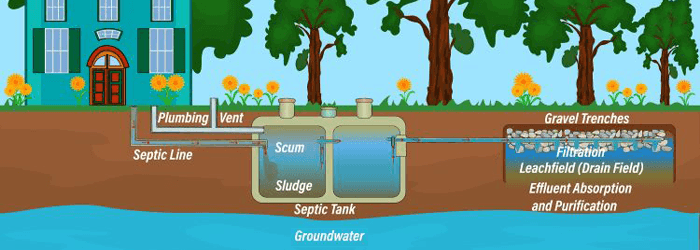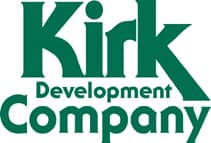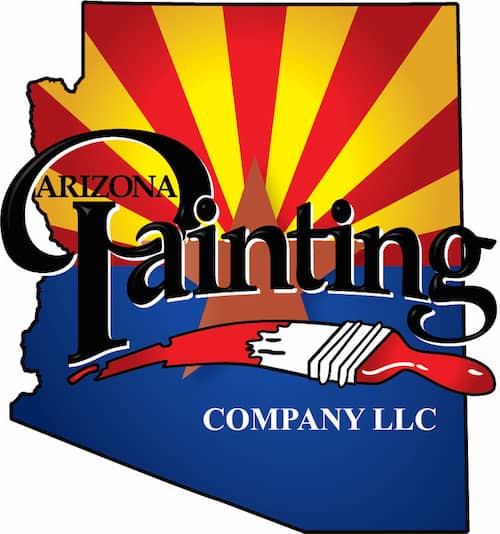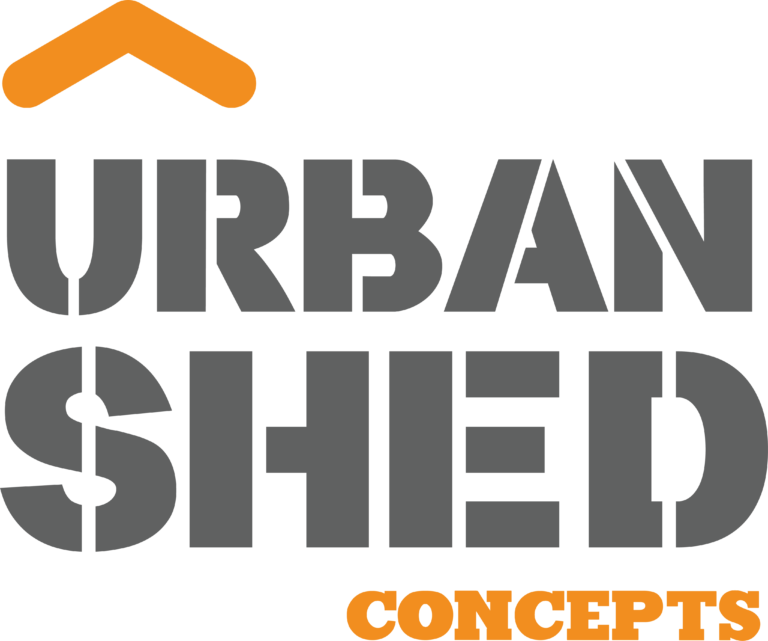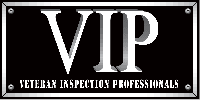Servicing of Your #SepticSystem
Not all homes are connected to a city’s sewer system. It’s important to know whether or not yours is connected. Homes that do not have a direct connection will typically have a septic system.
A septic system consists of a buried two-chambered tank connected directly to your home’s pipes. Solid waste will fall and collect at the bottom of the tank to eventually be pumped out. Fluids and less dense waste will continue to be drained into the drainfield, also called a leach field. This field is essentially an area on the property where liquids drain deep into the soil, are broken down by bacteria, and converted to nutrients. Any water that stays near the surface will eventually evaporate.
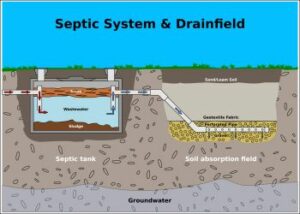
While it’s a fairly straightforward system, it must be properly used and maintained to avoid potential issues. When having a septic system, one must be acutely aware of what they put down the drain and how it affects the system.
To replenish bacteria levels, treat the system monthly with enzymes specifically made for septic systems. If monthly maintenance is too much, products such as RID-X which contains billions of active bacteria can be used annually. A professional company should pump tanks every three to five years. If an excess amount of sludge has built up, it will require cleaning in addition to pumping.
The septic system’s leach field and tank must be maintained properly. Skipping the regular maintenance can result in the tank water becoming greasy. This grease then deposits into the soil, preventing water from passing through and thus saturating the leach field. An over-saturated leach field has multiple repercussions.
- Soiled water can back up into your home, appearing in the toilet and bathtub drains.
- On the exterior, the area around the leach field may appear soggy, or even flooded with standing water. Any standing water that finds its way under your house can spell disaster for your foundation.
- A subtle cause of oversaturation can be leaky faucets or running toilets.
Water constantly draining into the field keeps it saturated 24/7. That draining will eventually lead to oversaturation.
Septic System Dos & Don’ts
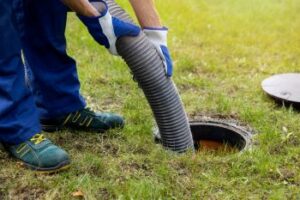
Want to skip the maintenance? Don’t! Filthy water can wind up back in your house. That’s a mess no one wants to clean up!
- Do – Know where your septic system and drainfield are located. Keep a record of that on hand.
- Do – Locate new patios, driveways, carports, and concrete pads away from the tank and the leach field.
- Do – Treat your system once a month with an enzyme bacteria treatment specifically for septic tanks.
- Do – Call a pumping company to inspect the septic system every three to five years. Depending on how much sludge has built up in the tank, you may have to have it pumped, or have it pumped and cleaned. Pumping removes the liquid and the scum that floats on top of the water. Cleaning removes the sludge that settles on the bottom. The process will cost you a few hundred dollars.
- Do & Don’t – It’s okay to plant grass over and near your septic system, but that’s it. Plants, shrubs, and trees with deep root systems literally chase the septic water for nutrition and can grow right into the pipes and even through the seams of the tank. That can cause never-ending trouble.
- Don’t – If you add a room to your house, don’t build it within 10 feet of your septic tank. If you really want to locate your new room on the same spot as your septic system, you’ll have to move the tank at least 10 feet away.
- Don’t – If your property also has a drinking water well, don’t relocate the septic tank within 100 feet of the well.
- Don’t – Drive or park your car over the septic system. The tank is buried, but not very deep. The car’s weight can damage pipes or the tank. It can also compact the soil in your drainfield, which can prevent water from leaching deep into the ground.
- Don’t – Treat the system with household cleaners. It can kill the beneficial bacteria in the tank that breaks down the waste. The enzyme treatment restores the bacteria.
- Don’t – Pour cooking grease down the kitchen drain.
- Don’t – Flush any household or personal products down the toilet. Because they’re slow to biodegrade, they can clog your system’s pipes, take up space in the tank and cost you more money when it’s time to clean your system.
Septic systems, like any system or equipment regularly used by homeowners, require an understanding of its functions and limitations. Proper maintenance and use of your septic system can allow it to thrive for up to thirty years.
Home Maintenance To-Do | #SepticSystem
###
PODCAST
A properly maintained septic system is a must. We have some do’s and don’ts to consider. Plus homeowner questions on wall insulation, moisture buildup below stucco, shower leak, pool decking and draining plus a sink glued to a granite bathroom countertop. Broadcasting From The SAHBA Home Show in Tucson!
Podcast Archive With Expanded Content and Resources
PHOTO CREDITS
- Shutterstock

